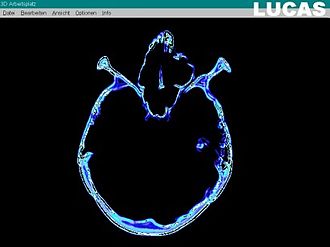Laboratory Unit for Computer Assisted Surgery
Research laboratory focused on computer-assisted surgery
The Laboratory Unit for Computer Assisted Surgery (LUCAS) is a pioneering research facility dedicated to the advancement of computer-assisted surgery (CAS). Located at the University of Leipzig, LUCAS is renowned for its innovative contributions to the field of surgical technology and its role in developing new methods and tools that enhance surgical precision and patient outcomes.
History[edit]
LUCAS was established in the early 2000s as part of a broader initiative to integrate advanced computing technologies into medical practice. The laboratory was founded with the goal of bridging the gap between computer science and surgical practice, fostering interdisciplinary collaboration among surgeons, engineers, and computer scientists.
Research Focus[edit]
LUCAS focuses on several key areas within computer-assisted surgery:
Image-Guided Surgery[edit]

One of the primary research areas at LUCAS is image-guided surgery, which involves the use of medical imaging technologies such as MRI and CT scans to guide surgical procedures. Researchers at LUCAS develop algorithms and software that allow surgeons to visualize and navigate complex anatomical structures with greater accuracy.
Robotic Surgery[edit]
LUCAS is also involved in the development of robotic surgery systems. These systems enhance the surgeon's ability to perform delicate and precise movements, reducing the risk of human error. The laboratory works on improving the haptic feedback and control systems of surgical robots to make them more intuitive and effective.
Augmented Reality in Surgery[edit]

Another innovative area of research at LUCAS is the application of augmented reality (AR) in surgery. By overlaying digital information onto the surgeon's view, AR can provide real-time data and visual cues that assist in decision-making during operations.
Collaborations[edit]
LUCAS collaborates with various academic and industrial partners worldwide. These collaborations aim to accelerate the development and adoption of new technologies in clinical settings. The laboratory frequently partners with medical device manufacturers and healthcare institutions to test and refine its innovations.
Education and Training[edit]
In addition to research, LUCAS is committed to education and training. The laboratory offers workshops and courses for medical students, residents, and practicing surgeons to familiarize them with the latest advancements in computer-assisted surgery. These programs emphasize hands-on experience with cutting-edge technologies.
Future Directions[edit]
Looking forward, LUCAS aims to expand its research into artificial intelligence and machine learning applications in surgery. By leveraging these technologies, the laboratory hopes to further enhance the capabilities of computer-assisted surgical systems, making them more adaptive and intelligent.
Related Pages[edit]
Ad. Transform your life with W8MD's Budget GLP-1 injections from $75


W8MD offers a medical weight loss program to lose weight in Philadelphia. Our physician-supervised medical weight loss provides:
- Weight loss injections in NYC (generic and brand names):
- Zepbound / Mounjaro, Wegovy / Ozempic, Saxenda
- Most insurances accepted or discounted self-pay rates. We will obtain insurance prior authorizations if needed.
- Generic GLP1 weight loss injections from $75 for the starting dose.
- Also offer prescription weight loss medications including Phentermine, Qsymia, Diethylpropion, Contrave etc.
NYC weight loss doctor appointmentsNYC weight loss doctor appointments
Start your NYC weight loss journey today at our NYC medical weight loss and Philadelphia medical weight loss clinics.
- Call 718-946-5500 to lose weight in NYC or for medical weight loss in Philadelphia 215-676-2334.
- Tags:NYC medical weight loss, Philadelphia lose weight Zepbound NYC, Budget GLP1 weight loss injections, Wegovy Philadelphia, Wegovy NYC, Philadelphia medical weight loss, Brookly weight loss and Wegovy NYC
|
WikiMD's Wellness Encyclopedia |
| Let Food Be Thy Medicine Medicine Thy Food - Hippocrates |
Medical Disclaimer: WikiMD is not a substitute for professional medical advice. The information on WikiMD is provided as an information resource only, may be incorrect, outdated or misleading, and is not to be used or relied on for any diagnostic or treatment purposes. Please consult your health care provider before making any healthcare decisions or for guidance about a specific medical condition. WikiMD expressly disclaims responsibility, and shall have no liability, for any damages, loss, injury, or liability whatsoever suffered as a result of your reliance on the information contained in this site. By visiting this site you agree to the foregoing terms and conditions, which may from time to time be changed or supplemented by WikiMD. If you do not agree to the foregoing terms and conditions, you should not enter or use this site. See full disclaimer.
Credits:Most images are courtesy of Wikimedia commons, and templates, categories Wikipedia, licensed under CC BY SA or similar.
Translate this page: - East Asian
中文,
日本,
한국어,
South Asian
हिन्दी,
தமிழ்,
తెలుగు,
Urdu,
ಕನ್ನಡ,
Southeast Asian
Indonesian,
Vietnamese,
Thai,
မြန်မာဘာသာ,
বাংলা
European
español,
Deutsch,
français,
Greek,
português do Brasil,
polski,
română,
русский,
Nederlands,
norsk,
svenska,
suomi,
Italian
Middle Eastern & African
عربى,
Turkish,
Persian,
Hebrew,
Afrikaans,
isiZulu,
Kiswahili,
Other
Bulgarian,
Hungarian,
Czech,
Swedish,
മലയാളം,
मराठी,
ਪੰਜਾਬੀ,
ગુજરાતી,
Portuguese,
Ukrainian